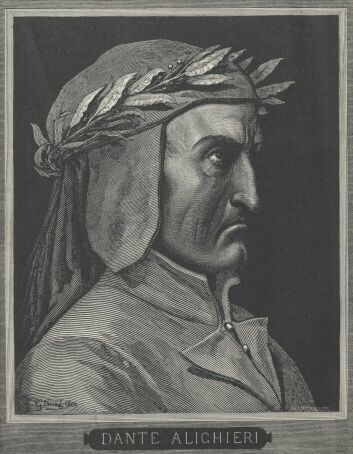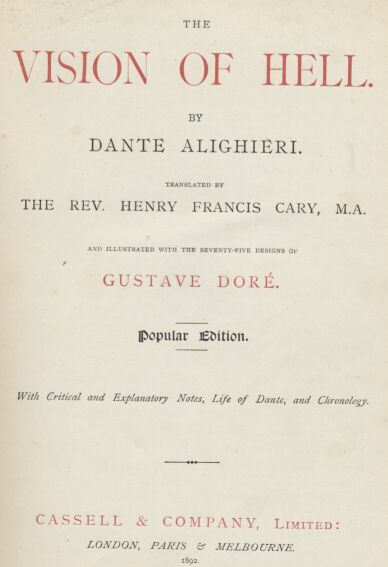CANTO XVIII
THERE is a place within the depths of hell
Call'd Malebolge, all of rock dark-stain'd
With hue ferruginous, e'en as the steep
That round it circling winds. Right in the midst
Of that abominable region, yawns
A spacious gulf profound, whereof the frame
Due time shall tell. The circle, that remains,
Throughout its round, between the gulf and base
Of the high craggy banks, successive forms
Ten trenches, in its hollow bottom sunk.
As where to guard the walls, full many a foss
Begirds some stately castle, sure defence
Affording to the space within, so here
Were model'd these; and as like fortresses
E'en from their threshold to the brink without,
Are flank'd with bridges; from the rock's low base
Thus flinty paths advanc'd, that 'cross the moles
And dikes, struck onward far as to the gulf,
That in one bound collected cuts them off.
Such was the place, wherein we found ourselves
From Geryon's back dislodg'd. The bard to left
Held on his way, and I behind him mov'd.
On our right hand new misery I saw,
New pains, new executioners of wrath,
That swarming peopled the first chasm. Below
Were naked sinners. Hitherward they came,
Meeting our faces from the middle point,
With us beyond but with a larger stride.
E'en thus the Romans, when the year returns
Of Jubilee, with better speed to rid
The thronging multitudes, their means devise
For such as pass the bridge; that on one side
All front toward the castle, and approach
Saint Peter's fane, on th' other towards the mount.
Each divers way along the grisly rock,
Horn'd demons I beheld, with lashes huge,
That on their back unmercifully smote.
Ah! how they made them bound at the first stripe!
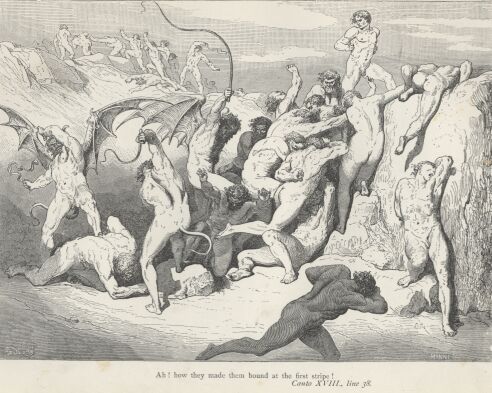
None for the second waited nor the third.
Meantime as on I pass'd, one met my sight
Whom soon as view'd; "Of him," cried I, "not yet
Mine eye hath had his fill." With fixed gaze
I therefore scann'd him. Straight the teacher kind
Paus'd with me, and consented I should walk
Backward a space, and the tormented spirit,
Who thought to hide him, bent his visage down.
But it avail'd him nought; for I exclaim'd:
"Thou who dost cast thy eye upon the ground,
Unless thy features do belie thee much,
Venedico art thou. But what brings thee
Into this bitter seas'ning?" He replied:
"Unwillingly I answer to thy words.
But thy clear speech, that to my mind recalls
The world I once inhabited, constrains me.
Know then 'twas I who led fair Ghisola
To do the Marquis' will, however fame
The shameful tale have bruited. Nor alone
Bologna hither sendeth me to mourn
Rather with us the place is so o'erthrong'd
That not so many tongues this day are taught,
Betwixt the Reno and Savena's stream,
To answer SIPA in their country's phrase.
And if of that securer proof thou need,
Remember but our craving thirst for gold."
Him speaking thus, a demon with his thong
Struck, and exclaim'd, "Away! corrupter! here
Women are none for sale." Forthwith I join'd
My escort, and few paces thence we came
To where a rock forth issued from the bank.
That easily ascended, to the right
Upon its splinter turning, we depart
From those eternal barriers. When arriv'd,
Where underneath the gaping arch lets pass
The scourged souls: "Pause here," the teacher said,
"And let these others miserable, now
Strike on thy ken, faces not yet beheld,
For that together they with us have walk'd."
From the old bridge we ey'd the pack, who came
From th' other side towards us, like the rest,
Excoriate from the lash. My gentle guide,
By me unquestion'd, thus his speech resum'd:
"Behold that lofty shade, who this way tends,
And seems too woe-begone to drop a tear.
How yet the regal aspect he retains!
Jason is he, whose skill and prowess won
The ram from Colchos. To the Lemnian isle
His passage thither led him, when those bold
And pitiless women had slain all their males.
There he with tokens and fair witching words
Hypsipyle beguil'd, a virgin young,
Who first had all the rest herself beguil'd.
Impregnated he left her there forlorn.
Such is the guilt condemns him to this pain.
Here too Medea's inj'ries are avenged.
All bear him company, who like deceit
To his have practis'd. And thus much to know
Of the first vale suffice thee, and of those
Whom its keen torments urge." Now had we come
Where, crossing the next pier, the straighten'd path
Bestrides its shoulders to another arch.
Hence in the second chasm we heard the ghosts,
Who jibber in low melancholy sounds,
With wide-stretch'd nostrils snort, and on themselves
Smite with their palms. Upon the banks a scurf
From the foul steam condens'd, encrusting hung,
That held sharp combat with the sight and smell.
So hollow is the depth, that from no part,
Save on the summit of the rocky span,
Could I distinguish aught. Thus far we came;
And thence I saw, within the foss below,
A crowd immers'd in ordure, that appear'd
Draff of the human body. There beneath
Searching with eye inquisitive, I mark'd
One with his head so grim'd, 't were hard to deem,
If he were clerk or layman. Loud he cried:
"Why greedily thus bendest more on me,
Than on these other filthy ones, thy ken?"
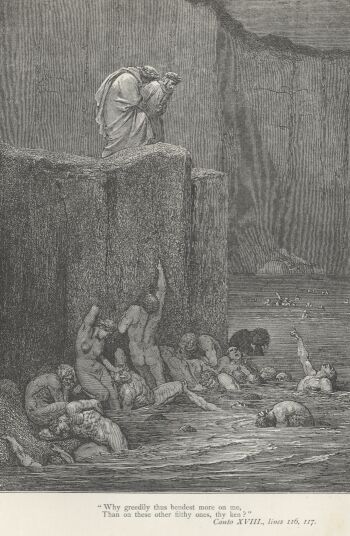
"Because if true my mem'ry," I replied,
"I heretofore have seen thee with dry locks,
And thou Alessio art of Lucca sprung.
Therefore than all the rest I scan thee more."
Then beating on his brain these words he spake:
"Me thus low down my flatteries have sunk,
Wherewith I ne'er enough could glut my tongue."
My leader thus: "A little further stretch
Thy face, that thou the visage well mayst note
Of that besotted, sluttish courtezan,
Who there doth rend her with defiled nails,
Now crouching down, now risen on her feet.
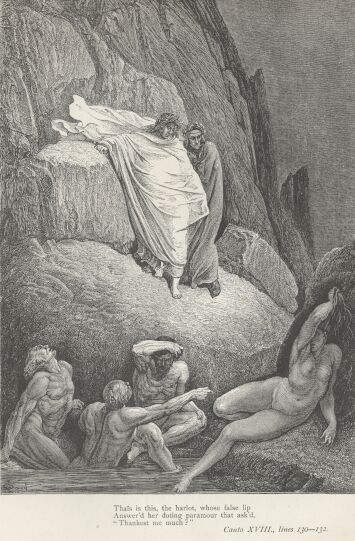
"Thais is this, the harlot, whose false lip
Answer'd her doting paramour that ask'd,
'Thankest me much!'—'Say rather wondrously,'
And seeing this here satiate be our view."
CANTO XIX
WOE to thee, Simon Magus! woe to you,
His wretched followers! who the things of God,
Which should be wedded unto goodness, them,
Rapacious as ye are, do prostitute
For gold and silver in adultery!
Now must the trumpet sound for you, since yours
Is the third chasm. Upon the following vault
We now had mounted, where the rock impends
Directly o'er the centre of the foss.
Wisdom Supreme! how wonderful the art,
Which thou dost manifest in heaven, in earth,
And in the evil world, how just a meed
Allotting by thy virtue unto all!
I saw the livid stone, throughout the sides
And in its bottom full of apertures,
All equal in their width, and circular each,
Nor ample less nor larger they appear'd
Than in Saint John's fair dome of me belov'd
Those fram'd to hold the pure baptismal streams,
One of the which I brake, some few years past,
To save a whelming infant; and be this
A seal to undeceive whoever doubts
The motive of my deed. From out the mouth
Of every one, emerg'd a sinner's feet
And of the legs high upward as the calf
The rest beneath was hid. On either foot
The soles were burning, whence the flexile joints
Glanc'd with such violent motion, as had snapt
Asunder cords or twisted withs. As flame,
Feeding on unctuous matter, glides along
The surface, scarcely touching where it moves;
So here, from heel to point, glided the flames.
"Master! say who is he, than all the rest
Glancing in fiercer agony, on whom
A ruddier flame doth prey?" I thus inquir'd.
"If thou be willing," he replied, "that I
Carry thee down, where least the slope bank falls,
He of himself shall tell thee and his wrongs."
I then: "As pleases thee to me is best.
Thou art my lord; and know'st that ne'er I quit
Thy will: what silence hides that knowest thou."
Thereat on the fourth pier we came, we turn'd,
And on our left descended to the depth,
A narrow strait and perforated close.
Nor from his side my leader set me down,
Till to his orifice he brought, whose limb
Quiv'ring express'd his pang. "Whoe'er thou art,
Sad spirit! thus revers'd, and as a stake
Driv'n in the soil!" I in these words began,
"If thou be able, utter forth thy voice."
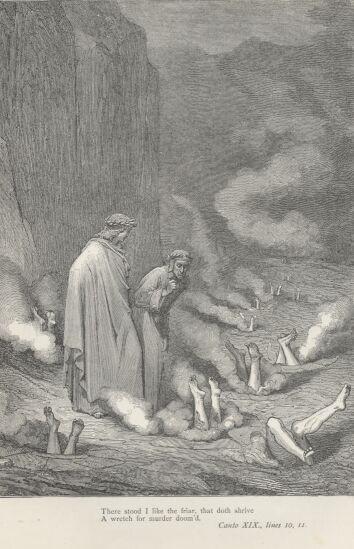
There stood I like the friar, that doth shrive
A wretch for murder doom'd, who e'en when fix'd,
Calleth him back, whence death awhile delays.
He shouted: "Ha! already standest there?
Already standest there, O Boniface!
By many a year the writing play'd me false.
So early dost thou surfeit with the wealth,
For which thou fearedst not in guile to take
The lovely lady, and then mangle her?"
I felt as those who, piercing not the drift
Of answer made them, stand as if expos'd
In mockery, nor know what to reply,
When Virgil thus admonish'd: "Tell him quick,
I am not he, not he, whom thou believ'st."
And I, as was enjoin'd me, straight replied.
That heard, the spirit all did wrench his feet,
And sighing next in woeful accent spake:
"What then of me requirest?" "If to know
So much imports thee, who I am, that thou
Hast therefore down the bank descended, learn
That in the mighty mantle I was rob'd,
And of a she-bear was indeed the son,
So eager to advance my whelps, that there
My having in my purse above I stow'd,
And here myself. Under my head are dragg'd
The rest, my predecessors in the guilt
Of simony. Stretch'd at their length they lie
Along an opening in the rock. 'Midst them
I also low shall fall, soon as he comes,
For whom I took thee, when so hastily
I question'd. But already longer time
Hath pass'd, since my souls kindled, and I thus
Upturn'd have stood, than is his doom to stand
Planted with fiery feet. For after him,
One yet of deeds more ugly shall arrive,
From forth the west, a shepherd without law,
Fated to cover both his form and mine.
He a new Jason shall be call'd, of whom
In Maccabees we read; and favour such
As to that priest his king indulgent show'd,
Shall be of France's monarch shown to him."
I know not if I here too far presum'd,
But in this strain I answer'd: "Tell me now,
What treasures from St. Peter at the first
Our Lord demanded, when he put the keys
Into his charge? Surely he ask'd no more
But, Follow me! Nor Peter nor the rest
Or gold or silver of Matthias took,
When lots were cast upon the forfeit place
Of the condemned soul. Abide thou then;
Thy punishment of right is merited:
And look thou well to that ill-gotten coin,
Which against Charles thy hardihood inspir'd.
If reverence of the keys restrain'd me not,
Which thou in happier time didst hold, I yet
Severer speech might use. Your avarice
O'ercasts the world with mourning, under foot
Treading the good, and raising bad men up.
Of shepherds, like to you, th' Evangelist
Was ware, when her, who sits upon the waves,
With kings in filthy whoredom he beheld,
She who with seven heads tower'd at her birth,
And from ten horns her proof of glory drew,
Long as her spouse in virtue took delight.
Of gold and silver ye have made your god,
Diff'ring wherein from the idolater,
But he that worships one, a hundred ye?
Ah, Constantine! to how much ill gave birth,
Not thy conversion, but that plenteous dower,
Which the first wealthy Father gain'd from thee!"
Meanwhile, as thus I sung, he, whether wrath
Or conscience smote him, violent upsprang
Spinning on either sole. I do believe
My teacher well was pleas'd, with so compos'd
A lip, he listen'd ever to the sound
Of the true words I utter'd. In both arms
He caught, and to his bosom lifting me
Upward retrac'd the way of his descent.
Nor weary of his weight he press'd me close,
Till to the summit of the rock we came,
Our passage from the fourth to the fifth pier.
His cherish'd burden there gently he plac'd
Upon the rugged rock and steep, a path
Not easy for the clamb'ring goat to mount.
Thence to my view another vale appear'd
CANTO XX
AND now the verse proceeds to torments new,
Fit argument of this the twentieth strain
Of the first song, whose awful theme records
The spirits whelm'd in woe. Earnest I look'd
Into the depth, that open'd to my view,
Moisten'd with tears of anguish, and beheld
A tribe, that came along the hollow vale,
In silence weeping: such their step as walk
Quires chanting solemn litanies on earth.
As on them more direct mine eye descends,
Each wondrously seem'd to be revers'd
At the neck-bone, so that the countenance
Was from the reins averted: and because
None might before him look, they were compell'd
To' advance with backward gait. Thus one perhaps
Hath been by force of palsy clean transpos'd,
But I ne'er saw it nor believe it so.
Now, reader! think within thyself, so God
Fruit of thy reading give thee! how I long
Could keep my visage dry, when I beheld
Near me our form distorted in such guise,
That on the hinder parts fall'n from the face
The tears down-streaming roll'd. Against a rock
I leant and wept, so that my guide exclaim'd:
"What, and art thou too witless as the rest?
Here pity most doth show herself alive,
When she is dead. What guilt exceedeth his,
Who with Heaven's judgment in his passion strives?
Raise up thy head, raise up, and see the man,
Before whose eyes earth gap'd in Thebes, when all
Cried out, 'Amphiaraus, whither rushest?
'Why leavest thou the war?' He not the less
Fell ruining far as to Minos down,
Whose grapple none eludes. Lo! how he makes
The breast his shoulders, and who once too far
Before him wish'd to see, now backward looks,
And treads reverse his path. Tiresias note,
Who semblance chang'd, when woman he became
Of male, through every limb transform'd, and then
Once more behov'd him with his rod to strike
The two entwining serpents, ere the plumes,
That mark'd the better sex, might shoot again.
"Aruns, with more his belly facing, comes.
On Luni's mountains 'midst the marbles white,
Where delves Carrara's hind, who wons beneath,
A cavern was his dwelling, whence the stars
And main-sea wide in boundless view he held.
"The next, whose loosen'd tresses overspread
Her bosom, which thou seest not (for each hair
On that side grows) was Manto, she who search'd
Through many regions, and at length her seat
Fix'd in my native land, whence a short space
My words detain thy audience. When her sire
From life departed, and in servitude
The city dedicate to Bacchus mourn'd,
Long time she went a wand'rer through the world.
Aloft in Italy's delightful land
A lake there lies, at foot of that proud Alp,
That o'er the Tyrol locks Germania in,
Its name Benacus, which a thousand rills,
Methinks, and more, water between the vale
Camonica and Garda and the height
Of Apennine remote. There is a spot
At midway of that lake, where he who bears
Of Trento's flock the past'ral staff, with him
Of Brescia, and the Veronese, might each
Passing that way his benediction give.
A garrison of goodly site and strong
Peschiera stands, to awe with front oppos'd
The Bergamese and Brescian, whence the shore
More slope each way descends. There, whatsoev'er
Benacus' bosom holds not, tumbling o'er
Down falls, and winds a river flood beneath
Through the green pastures. Soon as in his course
The steam makes head, Benacus then no more
They call the name, but Mincius, till at last
Reaching Governo into Po he falls.
Not far his course hath run, when a wide flat
It finds, which overstretchmg as a marsh
It covers, pestilent in summer oft.
Hence journeying, the savage maiden saw
'Midst of the fen a territory waste
And naked of inhabitants. To shun
All human converse, here she with her slaves
Plying her arts remain'd, and liv'd, and left
Her body tenantless. Thenceforth the tribes,
Who round were scatter'd, gath'ring to that place
Assembled; for its strength was great, enclos'd
On all parts by the fen. On those dead bones
They rear'd themselves a city, for her sake,
Calling it Mantua, who first chose the spot,
Nor ask'd another omen for the name,
Wherein more numerous the people dwelt,
Ere Casalodi's madness by deceit
Was wrong'd of Pinamonte. If thou hear
Henceforth another origin assign'd
Of that my country, I forewarn thee now,
That falsehood none beguile thee of the truth."
I answer'd: "Teacher, I conclude thy words
So certain, that all else shall be to me
As embers lacking life. But now of these,
Who here proceed, instruct me, if thou see
Any that merit more especial note.
For thereon is my mind alone intent."
He straight replied: "That spirit, from whose cheek
The beard sweeps o'er his shoulders brown, what time
Graecia was emptied of her males, that scarce
The cradles were supplied, the seer was he
In Aulis, who with Calchas gave the sign
When first to cut the cable. Him they nam'd
Eurypilus: so sings my tragic strain,
In which majestic measure well thou know'st,
Who know'st it all. That other, round the loins
So slender of his shape, was Michael Scot,
Practis'd in ev'ry slight of magic wile.
"Guido Bonatti see: Asdente mark,
Who now were willing, he had tended still
The thread and cordwain; and too late repents.
"See next the wretches, who the needle left,
The shuttle and the spindle, and became
Diviners: baneful witcheries they wrought
With images and herbs. But onward now:
For now doth Cain with fork of thorns confine
On either hemisphere, touching the wave
Beneath the towers of Seville. Yesternight
The moon was round. Thou mayst remember well:
For she good service did thee in the gloom
Of the deep wood." This said, both onward mov'd.
CANTO XXI
THUS we from bridge to bridge, with other talk,
The which my drama cares not to rehearse,
Pass'd on; and to the summit reaching, stood
To view another gap, within the round
Of Malebolge, other bootless pangs.
Marvelous darkness shadow'd o'er the place.
In the Venetians' arsenal as boils
Through wintry months tenacious pitch, to smear
Their unsound vessels; for th' inclement time
Sea-faring men restrains, and in that while
His bark one builds anew, another stops
The ribs of his, that hath made many a voyage;
One hammers at the prow, one at the poop;
This shapeth oars, that other cables twirls,
The mizen one repairs and main-sail rent
So not by force of fire but art divine
Boil'd here a glutinous thick mass, that round
Lim'd all the shore beneath. I that beheld,
But therein nought distinguish'd, save the surge,
Rais'd by the boiling, in one mighty swell
Heave, and by turns subsiding and fall. While there
I fix'd my ken below, "Mark! mark!" my guide
Exclaiming, drew me towards him from the place,
Wherein I stood. I turn'd myself as one,
Impatient to behold that which beheld
He needs must shun, whom sudden fear unmans,
That he his flight delays not for the view.
Behind me I discern'd a devil black,
That running, up advanc'd along the rock.
Ah! what fierce cruelty his look bespake!
In act how bitter did he seem, with wings
Buoyant outstretch'd and feet of nimblest tread!
His shoulder proudly eminent and sharp
Was with a sinner charg'd; by either haunch
He held him, the foot's sinew griping fast.
"Ye of our bridge!" he cried, "keen-talon'd fiends!
Lo! one of Santa Zita's elders! Him
Whelm ye beneath, while I return for more.
That land hath store of such. All men are there,
Except Bonturo, barterers: of 'no'
For lucre there an 'aye' is quickly made."
Him dashing down, o'er the rough rock he turn'd,
Nor ever after thief a mastiff loos'd
Sped with like eager haste. That other sank
And forthwith writing to the surface rose.
But those dark demons, shrouded by the bridge,
Cried "Here the hallow'd visage saves not: here
Is other swimming than in Serchio's wave.
Wherefore if thou desire we rend thee not,
Take heed thou mount not o'er the pitch." This said,
They grappled him with more than hundred hooks,
And shouted: "Cover'd thou must sport thee here;
So, if thou canst, in secret mayst thou filch."
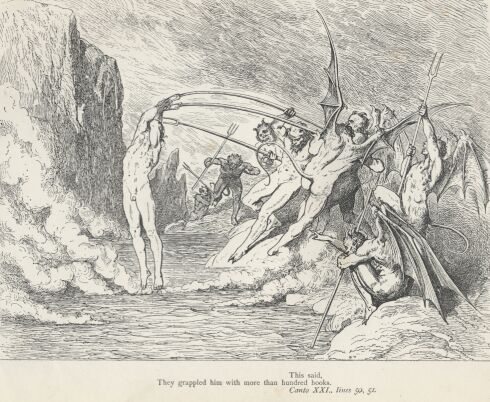
E'en thus the cook bestirs him, with his grooms,
To thrust the flesh into the caldron down
With flesh-hooks, that it float not on the top.
Me then my guide bespake: "Lest they descry,
That thou art here, behind a craggy rock
Bend low and screen thee; and whate'er of force
Be offer'd me, or insult, fear thou not:
For I am well advis'd, who have been erst
In the like fray." Beyond the bridge's head
Therewith he pass'd, and reaching the sixth pier,
Behov'd him then a forehead terror-proof.
With storm and fury, as when dogs rush forth
Upon the poor man's back, who suddenly
From whence he standeth makes his suit; so rush'd
Those from beneath the arch, and against him
Their weapons all they pointed. He aloud:
"Be none of you outrageous: ere your time
Dare seize me, come forth from amongst you one,
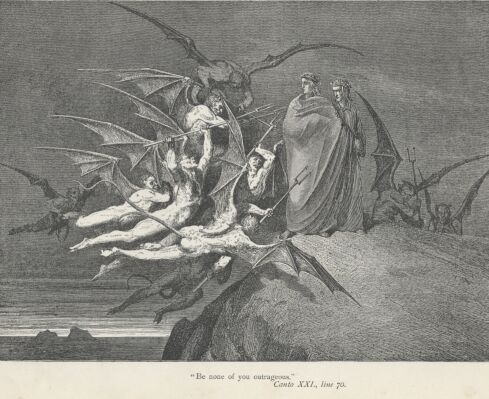
"Who having heard my words, decide he then
If he shall tear these limbs." They shouted loud,
"Go, Malacoda!" Whereat one advanc'd,
The others standing firm, and as he came,
"What may this turn avail him?" he exclaim'd.
"Believ'st thou, Malacoda! I had come
Thus far from all your skirmishing secure,"
My teacher answered, "without will divine
And destiny propitious? Pass we then
For so Heaven's pleasure is, that I should lead
Another through this savage wilderness."
Forthwith so fell his pride, that he let drop
The instrument of torture at his feet,
And to the rest exclaim'd: "We have no power
To strike him." Then to me my guide: "O thou!
Who on the bridge among the crags dost sit
Low crouching, safely now to me return."
I rose, and towards him moved with speed: the fiends
Meantime all forward drew: me terror seiz'd
Lest they should break the compact they had made.
Thus issuing from Caprona, once I saw
Th' infantry dreading, lest his covenant
The foe should break; so close he hemm'd them round.
I to my leader's side adher'd, mine eyes
With fixt and motionless observance bent
On their unkindly visage. They their hooks
Protruding, one the other thus bespake:
"Wilt thou I touch him on the hip?" To whom
Was answer'd: "Even so; nor miss thy aim."
But he, who was in conf'rence with my guide,
Turn'd rapid round, and thus the demon spake:
"Stay, stay thee, Scarmiglione!" Then to us
He added: "Further footing to your step
This rock affords not, shiver'd to the base
Of the sixth arch. But would you still proceed,
Up by this cavern go: not distant far,
Another rock will yield you passage safe.
Yesterday, later by five hours than now,
Twelve hundred threescore years and six had fill'd
The circuit of their course, since here the way
Was broken. Thitherward I straight dispatch
Certain of these my scouts, who shall espy
If any on the surface bask. With them
Go ye: for ye shall find them nothing fell.
Come Alichino forth," with that he cried,
"And Calcabrina, and Cagnazzo thou!
The troop of ten let Barbariccia lead.
With Libicocco Draghinazzo haste,
Fang'd Ciriatto, Grafflacane fierce,
And Farfarello, and mad Rubicant.
Search ye around the bubbling tar. For these,
In safety lead them, where the other crag
Uninterrupted traverses the dens."
I then: "O master! what a sight is there!
Ah! without escort, journey we alone,
Which, if thou know the way, I covet not.
Unless thy prudence fail thee, dost not mark
How they do gnarl upon us, and their scowl
Threatens us present tortures?" He replied:
"I charge thee fear not: let them, as they will,
Gnarl on: 't is but in token of their spite
Against the souls, who mourn in torment steep'd."
To leftward o'er the pier they turn'd; but each
Had first between his teeth prest close the tongue,
Toward their leader for a signal looking,
Which he with sound obscene triumphant gave.
CANTO XXII
IT hath been heretofore my chance to see
Horsemen with martial order shifting camp,
To onset sallying, or in muster rang'd,
Or in retreat sometimes outstretch'd for flight;
Light-armed squadrons and fleet foragers
Scouring thy plains, Arezzo! have I seen,
And clashing tournaments, and tilting jousts,
Now with the sound of trumpets, now of bells,
Tabors, or signals made from castled heights,
And with inventions multiform, our own,
Or introduc'd from foreign land; but ne'er
To such a strange recorder I beheld,
In evolution moving, horse nor foot,
Nor ship, that tack'd by sign from land or star.
With the ten demons on our way we went;
Ah fearful company! but in the church
With saints, with gluttons at the tavern's mess.
Still earnest on the pitch I gaz'd, to mark
All things whate'er the chasm contain'd, and those
Who burn'd within. As dolphins, that, in sign
To mariners, heave high their arched backs,
That thence forewarn'd they may advise to save
Their threaten'd vessels; so, at intervals,
To ease the pain his back some sinner show'd,
Then hid more nimbly than the lightning glance.
E'en as the frogs, that of a wat'ry moat
Stand at the brink, with the jaws only out,
Their feet and of the trunk all else concealed,
Thus on each part the sinners stood, but soon
As Barbariccia was at hand, so they
Drew back under the wave. I saw, and yet
My heart doth stagger, one, that waited thus,
As it befalls that oft one frog remains,
While the next springs away: and Graffiacan,
Who of the fiends was nearest, grappling seiz'd
His clotted locks, and dragg'd him sprawling up,
That he appear'd to me an otter. Each
Already by their names I knew, so well
When they were chosen, I observ'd, and mark'd
How one the other call'd. "O Rubicant!
See that his hide thou with thy talons flay,"
Shouted together all the cursed crew.
Then I: "Inform thee, master! if thou may,
What wretched soul is this, on whom their hand
His foes have laid." My leader to his side
Approach'd, and whence he came inquir'd, to whom
Was answer'd thus: "Born in Navarre's domain
My mother plac'd me in a lord's retinue,
For she had borne me to a losel vile,
A spendthrift of his substance and himself.
The good king Thibault after that I serv'd,
To peculating here my thoughts were turn'd,
Whereof I give account in this dire heat."
Straight Ciriatto, from whose mouth a tusk
Issued on either side, as from a boar,
Ript him with one of these. 'Twixt evil claws
The mouse had fall'n: but Barbariccia cried,
Seizing him with both arms: "Stand thou apart,
While I do fix him on my prong transpierc'd."
Then added, turning to my guide his face,
"Inquire of him, if more thou wish to learn,
Ere he again be rent." My leader thus:
"Then tell us of the partners in thy guilt;
Knowest thou any sprung of Latian land
Under the tar?"—"I parted," he replied,
"But now from one, who sojourn'd not far thence;
So were I under shelter now with him!
Nor hook nor talon then should scare me more."—.
"Too long we suffer," Libicocco cried,
Then, darting forth a prong, seiz'd on his arm,
And mangled bore away the sinewy part.
Him Draghinazzo by his thighs beneath
Would next have caught, whence angrily their chief,
Turning on all sides round, with threat'ning brow
Restrain'd them. When their strife a little ceas'd,
Of him, who yet was gazing on his wound,
My teacher thus without delay inquir'd:
"Who was the spirit, from whom by evil hap
Parting, as thou has told, thou cam'st to shore?"—
"It was the friar Gomita," he rejoin'd,
"He of Gallura, vessel of all guile,
Who had his master's enemies in hand,
And us'd them so that they commend him well.
Money he took, and them at large dismiss'd.
So he reports: and in each other charge
Committed to his keeping, play'd the part
Of barterer to the height: with him doth herd
The chief of Logodoro, Michel Zanche.
Sardinia is a theme, whereof their tongue
Is never weary. Out! alas! behold
That other, how he grins! More would I say,
But tremble lest he mean to maul me sore."
Their captain then to Farfarello turning,
Who roll'd his moony eyes in act to strike,
Rebuk'd him thus: "Off! cursed bird! Avaunt!"—
"If ye desire to see or hear," he thus
Quaking with dread resum'd, "or Tuscan spirits
Or Lombard, I will cause them to appear.
Meantime let these ill talons bate their fury,
So that no vengeance they may fear from them,
And I, remaining in this self-same place,
Will for myself but one, make sev'n appear,
When my shrill whistle shall be heard; for so
Our custom is to call each other up."
Cagnazzo at that word deriding grinn'd,
Then wagg'd the head and spake: "Hear his device,
Mischievous as he is, to plunge him down."
Whereto he thus, who fail'd not in rich store
Of nice-wove toils; "Mischief forsooth extreme,
Meant only to procure myself more woe!"
No longer Alichino then refrain'd,
But thus, the rest gainsaying, him bespake:
"If thou do cast thee down, I not on foot
Will chase thee, but above the pitch will beat
My plumes. Quit we the vantage ground, and let
The bank be as a shield, that we may see
If singly thou prevail against us all."
Now, reader, of new sport expect to hear!
They each one turn'd his eyes to the' other shore,
He first, who was the hardest to persuade.
The spirit of Navarre chose well his time,
Planted his feet on land, and at one leap
Escaping disappointed their resolve.
Them quick resentment stung, but him the most,
Who was the cause of failure; in pursuit
He therefore sped, exclaiming: "Thou art caught."
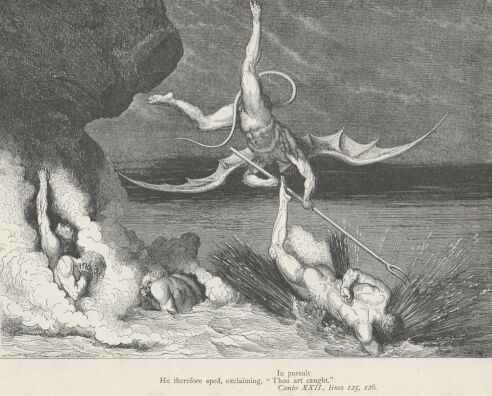
But little it avail'd: terror outstripp'd
His following flight: the other plung'd beneath,
And he with upward pinion rais'd his breast:
E'en thus the water-fowl, when she perceives
The falcon near, dives instant down, while he
Enrag'd and spent retires. That mockery
In Calcabrina fury stirr'd, who flew
After him, with desire of strife inflam'd;
And, for the barterer had 'scap'd, so turn'd
His talons on his comrade. O'er the dyke
In grapple close they join'd; but the' other prov'd
A goshawk able to rend well his foe;
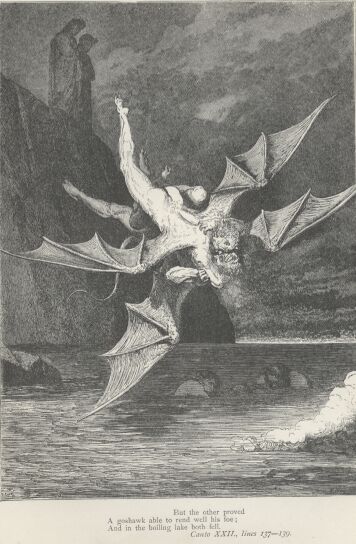
And in the boiling lake both fell. The heat
Was umpire soon between them, but in vain
To lift themselves they strove, so fast were glued
Their pennons. Barbariccia, as the rest,
That chance lamenting, four in flight dispatch'd
From the' other coast, with all their weapons arm'd.
They, to their post on each side speedily
Descending, stretch'd their hooks toward the fiends,
Who flounder'd, inly burning from their scars:
And we departing left them to that broil.
|

